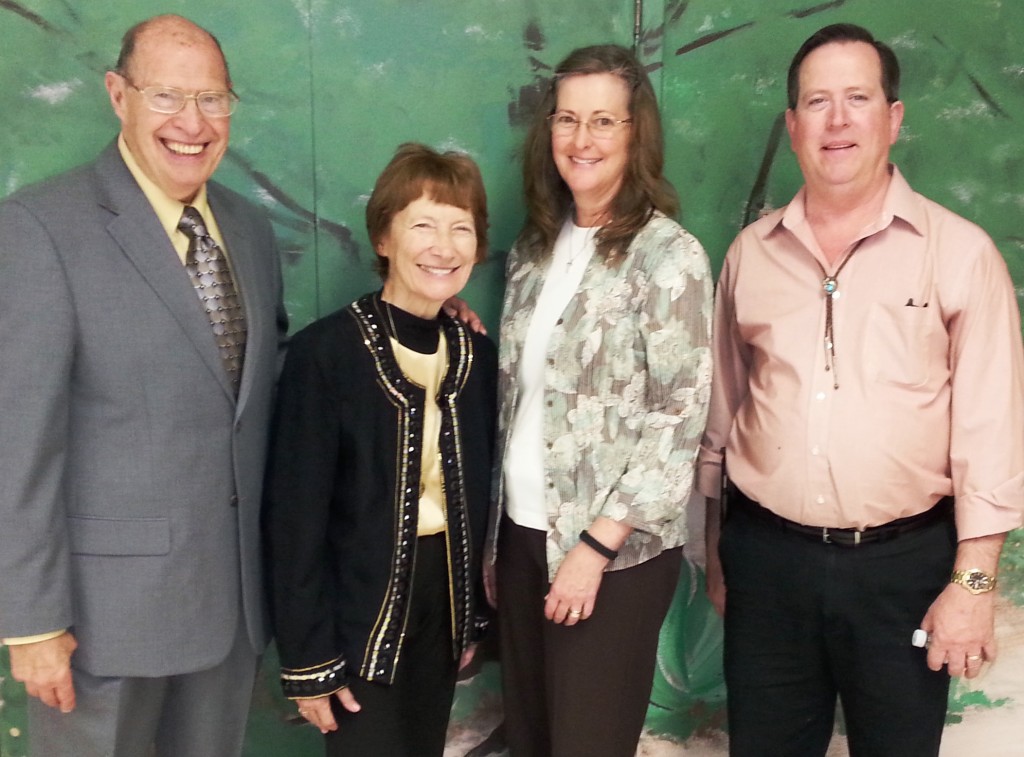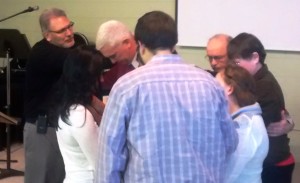Dear Brothers and Sisters in Christ,
 Scripture tells us that Jesus, our High Priest, was “tempted in every way, just as we are—yet he did not sin” (Hebrews 4:15). This powerful truth is represented in the historic Christian teaching that Jesus, in his humanity, is the “vicarious man.”
Scripture tells us that Jesus, our High Priest, was “tempted in every way, just as we are—yet he did not sin” (Hebrews 4:15). This powerful truth is represented in the historic Christian teaching that Jesus, in his humanity, is the “vicarious man.”
Vicarious is a Latin word that means “in place of another,” or “on another’s behalf.” Through the Incarnation, the eternal Son of God, while remaining God, became human. Calvin referred to this as the “wondrous exchange.” T. F. Torrance used the word substitution: “In the incarnation, the Son of God abased himself, substituted himself in our place, interposed himself between us and God the Father, taking all our shame and curse upon himself, not as a third person, but as one who is God himself” (Atonement, p. 151). In one of his books, our friend Chris Kettler refers to “the deep interaction between Christ’s humanity and our humanity at the level of our being, the ontological level.”

In his vicarious humanity, Jesus represents all humanity. He is the second Adam who is far superior to the first. Representing us, Jesus was baptized for us—the sinless one baptized for sinful humanity. Our baptism then is a participation in his. Representing us, Jesus was crucified and died for us so that we may live (Romans 6:4). Then Jesus rose from the grave, making us alive with him (Ephesians 2:4-5). Then he ascended, seating us with him in the heavenly realms (Ephesians 2:6). Everything Jesus did, he did in our place, on our behalf. And that includes being tempted on our behalf.
I find it encouraging to know that Jesus went through the same temptations I face and overcame them in my place, on my behalf. To face our temptations and overcome them was one of the reasons Jesus went into the wilderness following his baptism. Even though the enemy was there to interfere, Jesus prevailed. He is the overcomer—on my behalf, in my place. Understanding this makes a world of difference!
In my Weekly Update letter last week, I wrote about the crisis that many face concerning their identity. I shared three unhelpful ways that people typically identify themselves: by what they do, by what others say about them and by what they possess. It’s interesting to note that the three temptations faced by Jesus in the wilderness had to do with all three of these identity factors.
You will recall that in the Gospel accounts of Jesus’ temptation in the wilderness (in Matthew and Luke), the Holy Spirit led Jesus into the wilderness to be tempted by the enemy. Jesus did not go through these trials alone. He was accompanied by the Holy Spirit. He was never alone—just as we are never alone.
After 40 days of prayer and fasting, the enemy came to Jesus and said, “If…” Now that’s a big word, and I suggest that many of our own temptations start with the word “if.” “If I could just…” “If you are…” “If you had your way…” etc. Satan taunted Jesus with the words, “If you are the Son of God…” In doing so, Satan was tempting Jesus to doubt his true identity in relationship to his heavenly Father—to lead him to think he needed to prove his identity and act in certain ways to secure it for himself.
Satan sends similar temptations our way—calling into question our relationship to God and leading us to think that we, by our own efforts, must achieve our identity as children of God. But Jesus exposes the lies of these temptations hidden behind all of the “ifs.”
Jesus’ first temptation involved the false assumption, I am what I do. Satan said, ”If you are the Son of God, command these stones to become loaves of bread.” In other words, prove to yourself that you really are the Son of God. See if you have miraculous powers to feed yourself and demonstrate your self-sufficiency!
The second temptation involved the false assumption, I am what others say about me. Satan said to Jesus,“If you are the Son of God, throw yourself down and let the angels rescue you.” In other words, prove to yourself that you are the Son of God by seeing if the angels will obey your command and then if others witnessing this spectacle will confirm to who you are.
Jesus’ third temptation involved the false assumption, I am what I possess. Satan said, “If you are the Son of God, fall down and worship me and I will give you all the kingdoms of the world.” In other words, prove you are the Son of God by having all the rulers of the world under your authority as you ought to. Simply submit to my authority to take possession of them all.
Jesus saw through the false assumptions behind each temptation. With each one he replied, “It’s a lie!” For Jesus, there was no “If I am the Son of God,” but always “Because I AM the Son of God.” Jesus knew there was nothing he needed to do or possess to be who he truly was. Jesus knew who he was and remained secure in his relationship with the Father, confident in the Father’s faithfulness. Under the pressure of temptation, the Holy Spirit, who had sent him into the wilderness in the first place, was there to remind him. Knowing who he was, Jesus had no need to prove it to himself. He had no need to act independently from his Father, out of unbelief, as if he could not trust his Father’s love and provision.
Torrance reminds us that Jesus, being the Son of God, did not need to go through and overcome temptation for himself. In his vicarious humanity, Jesus met and overcame these temptations on our behalf: “It was for our sakes and in our place that Jesus lived that vicarious life in utter reliance upon God and in laying hold upon his mercy and goodness” (Incarnation, p. 125). Jesus did this for us knowing clearly who he was—the Son of God and the Son of Man.
For us to be delivered from temptations in our lives, it’s essential that we know who we truly are. As sinners saved by grace, we have a new identity—we are Jesus’ beloved brothers and sisters, God’s dearly loved children. This is not an identity we earn, and certainly not one others can give us. No, it’s something God has given to us through the vicarious humanity of his Son. We simply trust him to be who he is for us and then receive from him this new identity with much thanksgiving.
We take strength knowing that Jesus overcame for us the deceit of Satan’s subtle, yet powerful temptations concerning the nature and source of our true identity. As we live in Christ, secure in that identity, we will find that what used to tempt us and make us fall becomes less and less powerful. We grow in strength as we embrace and live into our true identity—secure in knowing it is ours in relationship with the triune God who is faithful and full of love for us his children.
If we are not secure in our true identity, temptations likely will set us back. We may doubt we are Christians, or that God loves us unconditionally. We might be tempted to think that being tempted means God has begun to withdraw from us. But knowing our true identity as God’s dearly beloved children is a freely-given gift. We can rest secure knowing that Jesus, in his vicarious humanity, overcame all temptation for us—in our place and on our behalf. Knowing this enables us to stand back up when we fall (and we will), make whatever amends we need to make, and trust God to lead us forward. In fact, confessing that we have fallen and are in need of God’s forgiveness are signs that God remains unconditionally faithful to us. Were he not, had he actually abandoned us, we never would turn back to him to receive again his freely-given grace and thus be renewed in his welcoming embrace.
Let us look to Jesus who was tempted in every way we are, yet without sin. Let us rely on his mercy, his love, his strength. And let us praise God because Jesus Christ, the vicarious human, has overcome for us.
Living in his grace and truth,
Joseph Tkach












